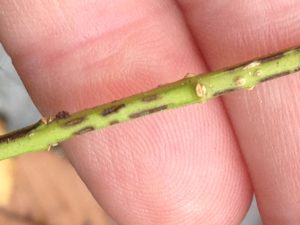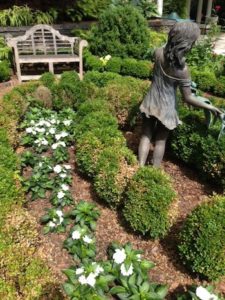 We have been keeping everyone informed about the boxwood blight since we identified it on a property in Atlanta. Let me say first that we are doing everything we can to prevent the disease from infecting your boxwoods. Unfortunately the fungicides available are of little help in preventing the disease and once the disease infects the plants it is impossible to control. The disease produces a very sticky microscopic spore and because of this it is easily spread by EVERYTHING! Dogs, cats, deer, rabbits, birds, any animal or person that moves through the boxwoods (the flower person, pruners, kids, you, etc.) spread this disease. Dwarf English and American are the most susceptible types while the Japanese and Korean (we’ll call the group Korean) are more resistant though they can harbor the disease. Initially it was thought that if it developed in the garden you could remove the infected American or Dwarf English and replace them with one of the Korean types. What we have seen this fall is that because the weather has been perfect for this disease to develop even the Korean group also has been severely affected. We have been keeping Dr. Woodward, a UGA Plant Pathologist up to date as we see this disease spread. Due to the severity of this problem we are suggesting that you do not plant additional boxwoods of any type until control measures are developed for this disease. Alternatives to the boxwoods are the Japanese hollies which we realize do not look the same but at least does not have this issue. If we see the disease on your property we will let you know. It is imperative that you remove infected boxwoods as soon as the disease develops. To reduce chance of spread, clothes and equipment should be sprayed with Lysol® when working with boxwoods. Dr. Woodwards report can be found here: Boxwood Report
We have been keeping everyone informed about the boxwood blight since we identified it on a property in Atlanta. Let me say first that we are doing everything we can to prevent the disease from infecting your boxwoods. Unfortunately the fungicides available are of little help in preventing the disease and once the disease infects the plants it is impossible to control. The disease produces a very sticky microscopic spore and because of this it is easily spread by EVERYTHING! Dogs, cats, deer, rabbits, birds, any animal or person that moves through the boxwoods (the flower person, pruners, kids, you, etc.) spread this disease. Dwarf English and American are the most susceptible types while the Japanese and Korean (we’ll call the group Korean) are more resistant though they can harbor the disease. Initially it was thought that if it developed in the garden you could remove the infected American or Dwarf English and replace them with one of the Korean types. What we have seen this fall is that because the weather has been perfect for this disease to develop even the Korean group also has been severely affected. We have been keeping Dr. Woodward, a UGA Plant Pathologist up to date as we see this disease spread. Due to the severity of this problem we are suggesting that you do not plant additional boxwoods of any type until control measures are developed for this disease. Alternatives to the boxwoods are the Japanese hollies which we realize do not look the same but at least does not have this issue. If we see the disease on your property we will let you know. It is imperative that you remove infected boxwoods as soon as the disease develops. To reduce chance of spread, clothes and equipment should be sprayed with Lysol® when working with boxwoods. Dr. Woodwards report can be found here: Boxwood Report

